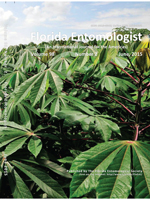This study was carried out to determine the effects of temperature, relative humidity (RH), and an additional food source (honey) on the survival of Metaseiulus occidentalis (Nesbitt) (Acari: Phytoseiidae) females under cold-storage conditions. Survival was evaluated after 2, 4, and 8 wk at 7 or 10 °C under 75 or 95% RH. At the end of each cold-storage interval, surviving females were transferred to bean leaf discs with Tetranychus urticae Koch (Prostigmata: Tetranychidae) as prey, and their longevity, total number of eggs, and number of eggs each female produced per day were recorded. The highest survival rate (78.3%) was observed after 2 wk at 10 °C and 95% RH without honey in the tube. Survival was next highest (75%) after 2 wk at 7 °C and 95% RH without honey in tube. Survival was 76.7% at 7 °C with 95% RH without honey after 4 wk. Survival was low after 8 wk at both 7 or 10 °C, with 0 and 13.3% survival, respectively, at 95% RH. Adult longevity, the total number of eggs deposited, and the average number of eggs per female per day were not significantly different between females held for 2 or 4 wk at 7 or 10 °C at 95% RH with or without honey. Based on these results, M. occidentalis can be cold stored at 7 and 10 °C at 95% RH for up to 4 wk, but adding honey provided no benefit to the females.
How to translate text using browser tools
1 June 2015
The Fitness of Metaseiulus occidentalis (Acari: Phytoseiidae) Adult Females after Different Intervals of Storage at Low Temperatures
Durdane Yanar,
Marjorie A. Hoy

Florida Entomologist
Vol. 98 • No. 2
June 2015
Vol. 98 • No. 2
June 2015
almacenamiento en frío
augmentative release
biological control
cold storage
Control biológico
depredadores
fecundidad




